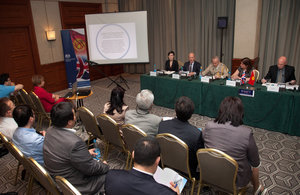British Embassy Activity in Kyrgyzstan
British Embassy activity was presented to the Kyrgyz public at a briefing hosted by the British Embassy Bishkek

Presentation on British Embassy Activity in Kyrgyzstan
On 10 June the British Embassy Bishkek team hosted a briefing for Kyrgyz government officials, NGO and civil society representatives to set out its activities to support the Kyrgyz government and people in creating a stable, democratic and prosperous future.
HM Ambassador Judith Farnworth explained that the UK’s priorities were promoting stability and prosperity – including developing good governance and supporting democracy; preventing regional conflict – including promoting human rights and combating organised crime, radicalisation and terrorism; supporting poverty reduction and improving the business climate.
Ms Syinat Sultanalieva, the Embassy’s Communications Manager explained that this year the Foreign and Commonwealth Bilateral Programme Budget will be used to fund a “criminal justice dialogue” for Kyrgyz and UK practitioners to visit each other’s countries and to learn about how their respective systems work; as well as projects to promote links between UK and Kyrgyz parliamentarians. Last year it supported work to improve Kyrgyz elections by learning the lessons of previous polls and producing accurate voter lists.
Bob Leverington, Head of DFID’s Central Asia Team, noted that the Department for International Development, DFID, had been working in Kyrgyzstan since 1998. He noted that between 2009-2015 DFID would invest roughly $40m in work to support the Kyrgyz government in extending development and prosperity across the country. In southern Kyrgyzstan, DFID was working to reduce ethnic tensions by creating economic opportunities for all. In Bishkek it was helping central government improve its financial management and was supporting, along with USAID, a major parliamentary support project entitled “Deepening Democracy”. Through the IOM, DFID had been active in enabling Kyrgyz migrant workers in Russia and Kyrgyzstan to understand and enjoy their rights.
Roy Wilson, the Regional Conflict Adviser, outlined how the Central-Asia wide Conflict Pool aimed to reducing the potential for conflict and promote stability in the region.. Planned projects included activity to further local and regional stability by reducing tensions between ethnic groups, and to increase cooperation among communities along the Afghan-Tajik border. The Conflict Pool was also implementing a project with Kyrgyz state institutions and religious leaders to prevent Islamist radicalisation and promote positive uses of Islam in resolving conflicts.
David Harrison, Defence Attache, spoke about cooperation between the British and Kyrgyz armed forces as set out in a Memorandum of Understanding between the two countries. Activities included teaching Kyrgyz military personnel English and supporting Kyrgyz ambitions to participate more in UN peacekeeping operations.